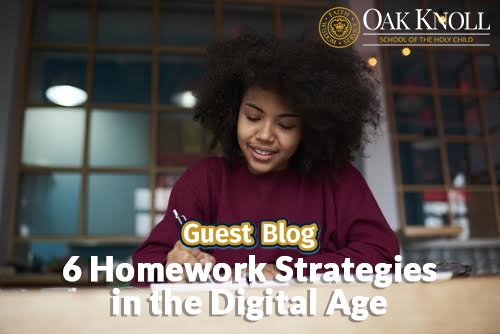One of the hardest things in parenting is helping kids stay focused while doing homework because of all the internal distractions, like dread of working on certain tasks, or the desire to check in with friends, and the many external technological distractions that live right on the same device they are using for homework. In a study by research psychologist, Larry Rosen, he found that “students studied less than 6 minutes before switching to technological distractors.” In this same research, he found that students who had study strategies were able to stay on task longer.

After looking into research on the topic, and working with my teens on this, here are some suggestions for helping your children stay focused while doing their homework.
- Spend several nights validating how hard it must be for children and adolescents to stay on task when doing homework given all the various tech distractions like Snapschats, texts, games etc. right on their homework device. Acknowledge that it is hard for you to stay on task when you are doing your work, taxes, etc. online because the pull of more fun activities is just one tab away.
- Ask your kids what has worked for them and what has not? Help them understand that you are not concerned about the short term of tonight’s homework, but how this is an important skill that will serve them well throughout their life.
- If they own a cellphone or other personal device besides the screen they are working on, talk about how important it is to put it out of site for extended periods of time. For my teens, they try to make a habit of putting their phones in another room during study time and then they check it about every 30 minutes for a break. I know many adolescents will be very opposed to not having their phone by their side. Try an experiment with them — have them keep their phone nearby and study for 15 minutes, and then have them put the phone in another room for 15 minutes and study. Then, talk about the experience.
- Use a timer. This can be very effective — an old-fashioned kitchen timer is ideal. Have them set a goal to study uninterrupted for a certain amount of time on a subject, 15 minutes for example. A set study interval lets the brain know an end is coming. This can help increase motivation to delve into a subject. The timer can be set for even 10 minutes or less.
- Encourage them to start their homework with their most dreaded assignment by saying to just spend five minutes on it. It may be that after the five minutes they want to continue. My son took an online course called “Learning How to Learn” where he discovered that the brain experiences the thought of doing work it does not want to do as physical pain. That's why it feels relieving in the moment to distract yourself with something else—otherwise known as procrastination. However, just a couple minutes into starting the feared task, that sensation of pain dissipates.
- Breaks — spend time talking about them. In Daniel Pink’s book, "Drive," he writes about how breaks were traditionally frowned upon in high performing work settings, but are now seen as critical to productivity. Breaks are particularly effective when they contain these elements: movement, fresh air, social interactions (so checking in with friends via social media counts for this — but ideally it would not be the only break students go to).
--
Delaney Ruston chose her two career paths of primary care physician and documentary filmmaker for one reason: to help create positive change in people’s lives. Her experiences receiving medical care in free clinics while growing up motivated her to pursue health care. During her medicine residency, she began studying filmmaking for social impact and made her first award-winning film.
For 20 years Delaney has split her time between providing primary care and creating short and feature-length documentaries, such as Screenagers. In Screenagers, Delaney takes a deeply personal approach as she probes into the vulnerable corners of family life, including her own, to explore struggles over social media, video games, academics and internet addiction. For more from the Screenages Blog, please click here.



